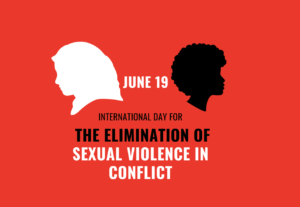 Sexual harassment and gender-based hate speech
Sexual harassment and gender-based hate speech
Every new wave of conflict brings with it a rising tide of human tragedy, including new waves of war’s oldest, most silenced, and least condemned crime – sexual violence. Conflict-related sexual violence, whether against women, girls, men, or boys in all their diversity, continues to be used as a tactic of war, torture, and terrorism amid deepening political and security crises, compounded by militarization and the illicit proliferation of arms.
New crises have multiplied as entrenched conflicts have deepened, resulting in shrinking civic space and rising reprisals against human rights defenders, activists, and journalists.
Sexual harassment and gender-based hate speech have surged in the digital space. While the use of information and communications technology has contributed to the empowerment of women and girls and other groups in vulnerable situations, its use has also enabled the propagation of violence.
In some settings, disturbing trends of gender-based hate speech and incitement to violence fuelled conflict in which rape and other forms of sexual violence are used to humiliate and destabilize targeted communities. Hate speech – including online – has become one of the most common ways of spreading divisive rhetoric on a global scale.
We must confront bigotry by working to tackle the hate that spreads like wildfire across the internet.”
António Guterres
Background
On 19 June 2015, the United Nations General Assembly (A/RES/69/293) proclaimed 19 June of each year the International Day for the Elimination of Sexual Violence in Conflict, in order to raise awareness of the need to put an end to conflict-related sexual violence, to honour the victims
Sexual harassment and gender-based hate speech
Every new wave of conflict brings with it a rising tide of human tragedy, including new waves of war’s oldest, most silenced, and least condemned crime – sexual violence. Conflict-related sexual violence, whether against women, girls, men, or boys in all their diversity, continues to be used as a tactic of war, torture, and terrorism amid deepening political and security crises, compounded by militarization and the illicit proliferation of arms.
New crises have multiplied as entrenched conflicts have deepened, resulting in shrinking civic space and rising reprisals against human rights defenders, activists, and journalists.
Sexual harassment and gender-based hate speech have surged in the digital space. While the use of information and communications technology has contributed to the empowerment of women and girls and other groups in vulnerable situations, its use has also enabled the propagation of violence.
In some settings, disturbing trends of gender-based hate speech and incitement to violence fuelled conflict in which rape and other forms of sexual violence are used to humiliate and destabilize targeted communities. Hate speech – including online – has become one of the most common ways of spreading divisive rhetoric on a global scale.
We must confront bigotry by working to tackle the hate that spreads like wildfire across the internet.”
António Guterres
Background
On 19 June 2015, the United Nations General Assembly (A/RES/69/293) proclaimed 19 June of each year the International Day for the Elimination of Sexual Violence in Conflict, in order to raise awareness of the need to put an end to conflict-related sexual violence, to honour the victims and survivors of sexual violence around the world and to pay tribute to all those who have courageously devoted their lives to and lost their lives in standing up for the eradication of these crimes.
The date was chosen to commemorate the adoption on 19 June 2008 of Security Council resolution 1820 (2008), in which the Council condemned sexual violence as a tactic of war and an impediment to peacebuilding.
In response to the rise in violent extremism, the Security Council adopted resolution S/RES/2331 (2016), the first to address the nexus between trafficking, sexual violence, terrorism and transnational organized crime. Acknowledging sexual violence as a tactic of terrorism, it further affirmed that victims of trafficking and sexual violence committed by terrorist groups should be eligible for official redress as victims of terrorism.
and survivors of sexual violence around the world and to pay tribute to all those who have courageously devoted their lives to and lost their lives in standing up for the eradication of these crimes.
The date was chosen to commemorate the adoption on 19 June 2008 of Security Council resolution 1820 (2008), in which the Council condemned sexual violence as a tactic of war and an impediment to peacebuilding.
In response to the rise in violent extremism, the Security Council adopted resolution S/RES/2331 (2016), the first to address the nexus between trafficking, sexual violence, terrorism and transnational organized crime. Acknowledging sexual violence as a tactic of terrorism, it further affirmed that victims of trafficking and sexual violence committed by terrorist groups should be eligible for official redress as victims of terrorism.















